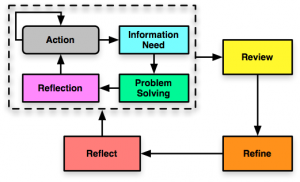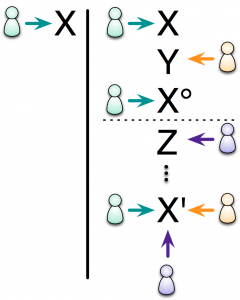In a recent post, I was trying to communicate the benefits of social learning: the additional processing that occurs while negotiating a shared understanding. Interestingly, the diagram I designed to accompany the post and communicate the concept was not well received. C’est la vie. As this was to be the representation on a slide talking about social learning, I was forced to come up with another way to communicate the concept. Instead of focusing on exactly the same concept, I decided to take another tack. The idea I’m communicating is how our model of learning has changed.
The first organized learning was really accomplished through apprenticeship: an individual would come to a task developing some artifact or performing some task, and would perform some minimal component in the context of the overall work. As we developed more abstract concepts, we moved to a dialog, where individuals would express their understanding, and others would engage in a conversation until agreement (even to disagree) was reached. Then, for efficiency reasons, we moved to a classroom model, where one individual would propose knowledge and the others would recite it.
The latter model has some problems, not least that the little learning would dissipate quickly, as it was typically knowledge focused and only applied in abstract ways. Such learning situations can be well-done, but only to the extent that there are meaningful tasks and learners are supported in accomplishing those tasks.
In other words, we move back to the apprenticeship model. Learning research has largely converged on a model that say we learn best when we are motivated and applying our knowledge to solve problems we realize are important, and are supported both with information resources and scaffolding, and reflection is guided around that performance. My favorite model is Collins & Brown’s Cognitive Apprenticeship, influenced by anthropological work and abstracting across several great pieces of work to create an integrated approach that still seems relevant.
In short, we’re looking backwards to how we learned naturally and bypassing a learning approach that is driven more by industrial and agricultural constraints than cognitive and social ones. We can certainly use technology to augment this approach, and we’re more aware of the nuances, but in taking a step back we’re taking a major step forward. How about that!


